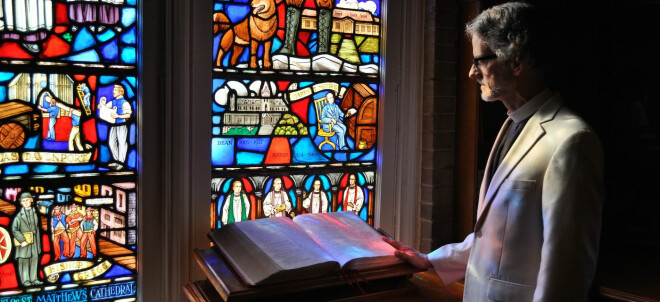Quick in the Past; Quick in the Future
Psalm 22 comes up in the old 30-day Psalter in the evening of the 4th day of the month. So on Tuesday, April 4, those of us who use that Psalter had an early taste of Holy Week. Psalm 22 famously begins, “My God, my God, look upon me; why hast thou forsaken me?” But it goes on from its bleak despair to several verses that soar with hope.
It is an interesting dynamic, that if we are willing to open ourselves to the depths, we can find that hope comes in and lifts us back to life. I often say to myself something like, Victor, don’t be afraid to go down; Jesus has already gone down there—and been raised up.
---
One of those hopeful verses in the latter part of Psalm 22 is this: “All they that go down into the dust shall kneel before him; * and no man hath quickened his own soul.” On first reading this seems an odd coupling. What does the second half of the verse have to do with the first? It begins with the hopeful claim that everyone who goes “down into the dust,” which is to say “everyone who dies,” will “kneel before” God: that all the dead will worship the Lord. And then it says that no person ever “quickened” himself. To “quicken” is an antique way of saying to “give life” or to “make alive”; “the quick and the dead” of the creed are “the living and the dead.” It is an obvious point: Life is something that we are given—it comes to us from outside ourselves. We might want to say that we receive life from our parents’ intimate embrace; they give us life. It is still more deeply true to say that God, working through them, gives us life.
But why make that point (that we are not authors of our own existence) right after saying hopefully that the dead will praise God?
The answer is that it is a hopeful thing to realize we are not the authors of our own existence. For, if our own coming into existence does not depend on us (the second part of the verse), nor must the future hope depend upon us (the first part of the verse). It’s as if an interlocutor spoke to the Psalmist:
Psalmist: “All they that go down into the dust shall kneel before him.”
Interlocutor: “How can they do that? They’re dead; they no longer have life.”
Psalmist: “Their own life was given to them, and just so this future life can be given to them. It’s all God’s work.”
---
The short version is this. God gave us life to begin with. So God can give us life again on the far side of death. As we can worship God now, so please God we may be granted to worship him then.
The pioneer of this human path is that completely human being, Jesus of Nazareth, who went down further than any of us will ever have to go. He cried out with a loud cry, “My God, my God, why hast thou forsaken me?” Those are the depths. And he is now the center of the praise of myriads upon myriads of saints.
One need not fear going down to the dust.
---


